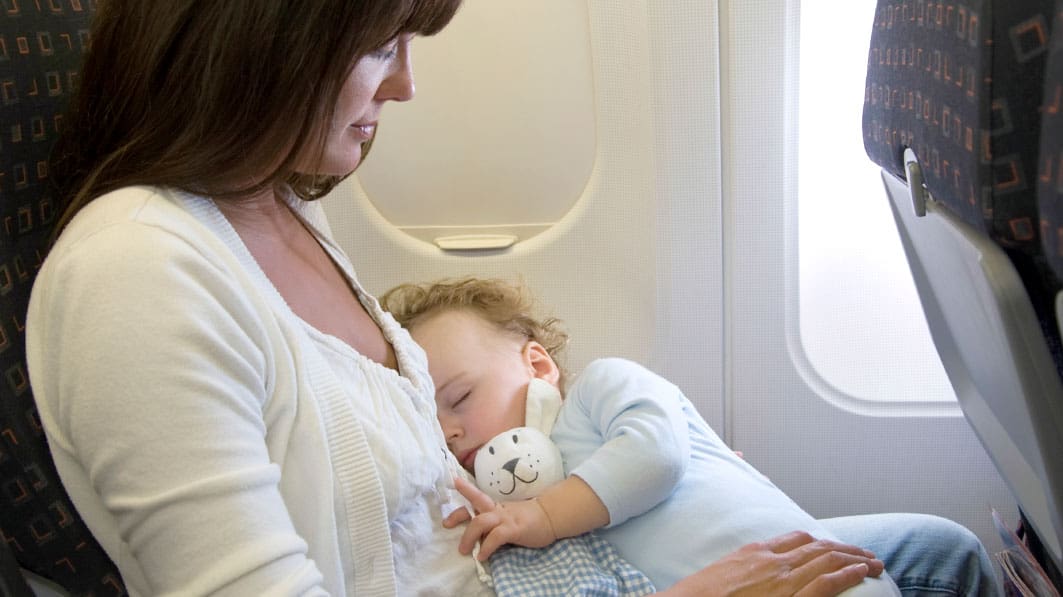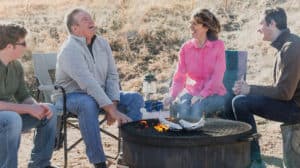Parenting takes on a whole new set of complexities when you travel with toddlers and infants. Schedules, safety and discipline are re-examined because of time constraints and consideration for others. We’ve compiled some great tips that other parents with babies and toddlers have used to help them not just survive, but enjoy their time away from the everyday routine:
Infant Car Kit
I kept an infant “emergency kit” in the glove compartment of each of my vehicles, which was a lifesaver for me.
Getting out of the house was a challenge in the newborn days, and I inevitably forgot the diaper bag more than once. By keeping a few diapers, a small pack of wipes and a spare outfit tucked away in this go-to location, I saved myself a lot of stress and “what now?” questions.
—Whitney Bausman
Sleepy-Time Travel
Traveling with an infant was a positive experience when I booked a flight that would allow my baby to follow her typical routine as much as possible. Flying during the baby’s usual two-hour naptime made the flight a lot easier because her routine was not interrupted. It’s a little detail worth remembering when planning trips.
—Courtney Roberts
It’s In the Bag
It can be a challenge to travel with kids who are old enough to dress themselves but still struggle to keep things orderly. To make navigating the suitcase easier, we put together outfits in advance: shirt, shorts, socks, undies. We make sure to pack enough outfits for each day of the trip, plus a few extra.
Each individual set is folded neatly and placed in a large, clear bag. The shirt can be placed on top with any graphics visible, making it easy to select without opening the package.
This method of packing helps our young child independently choose a clean, coordinated outfit each day. It also keeps clean clothes fresh and separate from dirty clothes.
—Cassia Elder
Keep Them Active
At airports, my husband and I have found that it is better to let our toddler have supervised run-around time after check-in is complete. Doing this can be tiring, but it is well worth the effort when our daughter sighs in relaxed satisfaction once she is seated in
the aircraft.
—Roopa Banerjee
Your Attention Please
I have found that the best resource to keep my kids happy on long flights is my attention. If I’m engaged with them, even items as simple as a pen and napkin can keep their attention for a long time. We’ve drawn houses together (taking turns adding one element at a time) and have had contests to sketch the silliest monster. When I don’t have paper or crayons handy, we take turns asking questions about each other or retelling funny family memories. After 30 minutes of my focused attention, my children are more likely to enjoy quiet time with sticker books and other independent activities.
—Christie Chu
Travel Snacks
During road trips, snacks can be messy. So a friend suggested using clear plastic boxes (the type normally sold for fishing tackle) as snack containers. The compartments in it are the right size for crackers or miniature boxes of raisins. The boxes stack well, and the lids snap shut, preventing messes. We put our kids’ names on the lids using alphabet stickers. These little boxes are a lifesaver on our road trips.
—David Cox
Backseat Bells and Baubles
I was worried about a long, upcoming car ride with my 7-month-old son. He barely could make it to the grocery store without fussing, so I knew the usual toys or songs that calmed him would grow old quickly.
I searched local secondhand shops for small light-up, shiny and musical toys that I could creatively attach to his car seat. The toys I chose could not throw down but he could watch or tap — they were ones that would captivate his attention with mirrors, bells, lights or songs.
Then I placed them in a bin under his seat. Whenever we stopped at a rest area, I switched out the toy for a new one. And it worked.
—Heather Vogler
Emergency Fun Kit
During our last trip to the hospital, we saw a family in the waiting area struggling to keep their
2-year-old son occupied. He was crying, whining and hungry, and his parents were clearly dismayed at
the long wait.
We have two children with cystic fibrosis, so we travel prepared. We shared our emergency fun pack with this family. These packs are filled with treats such as fruit candies, crackers, juice boxes
and cereal, along with a blanket and hand-sanitizing wipes. I also pack a few things to pass the
time, such as coloring books and crayons, Silly Putty, a stress ball and small toys. These kits have
helped us during unexpected hospital stays, in restaurants and on sudden long drives.
We keep the fun packs by the front door — one for boys and one for girls — ready to be grabbed in a
moment’s notice. They have allowed us to be prepared with our children and to share God’s love in a
tangible way with other families under stress.
—Adelle Norg
Road-Trip Respite
We took several long car trips before our son could walk, and often the climate or location didn’t allow for him to crawl or roll around at rest areas. But we found that most libraries, even those in small towns, have an area with toys and puzzles, in addition to books — a clean indoor place where we could take a short rest from driving and he could play for free!
—Tara Becker
Flying With Baby
I recently took my baby “across the pond” to visit his grandparents. Although traveling for 12 hours without my husband’s assistance was daunting, a few things helped keep my baby happy in flight.
I wore a baby sling to put my son in when he was tired so he could nap in a comfortable spot, and I brought extra bottles in case he wanted to eat more often than usual. On a previous flight, I learned to give him a bit less per feeding, lest I end up with a lap full of spit-up. I also hid my baby’s favorite toy about a week before we left, so that when I produced it on the plane it would be “new.” This kept him entertained for quite some time in between feedings and naps.
Ultimately, what helped the most was staying calm and being responsive to my baby’s needs.
—Amy Fischer
Flying With Toddlers
Last spring, when preparing to take a trip to Beijing with my little girl, I wondered how I’d keep her agreeable for the 18-hour flight.
My solution came in the form of a pint-sized backpack complete with wheels and a handle. I introduced my daughter to the pack at the airport. By the time she had wheeled that little bag up the ramp just like a grown-up, she was sold.
She enjoyed opening it during the flight. Then oOne by one, she extracted an array of never-before-seen items, including a miniature doodle toy, a puzzle, a book with a furry friend attached and fun snacks. The new — and inexpensive — items in the backpack held her attention.
—Tanara McCauley
Travel With Toddlers and Infants
Pack light. Some essentials can be purchased at your destination.
Plan for naps. Return to home base at regular intervals to avoid infant and toddler irritability.
Keep a routine. Maintain regular eating and bedtime routines so your child can enjoy the adventure within a predictable framework.
Ask for family-friendly services. Many theme parks, tour groups, resorts and destination sites offer unique services and set aside special travel seasons for families with infants and toddlers.
Keep it slow and simple. Reduce frustration by arranging plenty of stretch breaks and uncomplicated activities.
—Bridgette Booth
Tots on Board
Travel will be on the schedule for many families this year. A little preparation can go a long way to ease the transition from home to your destination.
- Start road trips at naptime or even bedtime.
- Bring a familiar toy or blanket. Pack a replacement in case the favorite object gets lost or left behind.
- Make phone calls to gather details before a trip. Note airline rules and amenities for babies and children. Ask hotels about equipment that you can borrow or rent.
- Bring bottled water and a small medical kit.
- Pack a small number of diapers, and buy more when you arrive at your destination.
- Avoid overloading your schedule so you can maintain regular eating and sleeping patterns.
- Dress your child in a super-absorbent diaper before boarding a plane.
- Games, puzzles, quiet activities, books on tape and electronics can be sanity savers on long trips.
- Start your day early since most little ones are wide-awake and ready to go before the rest of the world. End the day early with relaxing activities.
- Expect occasional meltdowns, but try to avoid them by giving your toddler time and room to run around.
Your child’s early years won’t last long, so plan well, keep expectations realistic, and try to enjoy the journey.
—Letitia Suk



















